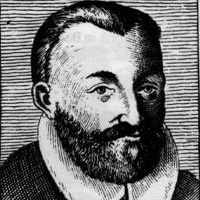On the Defense of the Comedy of Dante by Mazzoni
Mazzoni presents his view on metaphysics of art. As he says there are three types of artifice which subsequently constitute three species of arts. The Idea: The idea is the object of the ruling art or governing art. To produce a kite, we need certain idea. The Work: The work is its fabrication and it is based on the strategy of Idea. The Idol: The idol is the object to the imitative arts. Here we imitate the object recapped again.

Jacopo Mazzoni (1548-1598)
Therefore, there are three modes of the object that can be treated by artifice: the observable, the fabricable and the imitable. It can be put in the following ways also: Governing art as Idea, Fabricating art as Work, and Imitating art as Idol.
The poetry is imitable because it uses idol. It imitates idol with harmony, rhythm and verse accompanied by the credible and marvelous discovered by the civil faculty. Mazzoni then defines poetry in terms of the effects it produces in the reader. Poetic is the part of the civil faculty for the principle human actions and the cessations i.e. activities of pleasure and amusement, which prescribe the norms, the rules, and the laws of the poetic idol which poetry makes. Mazzoni says, ". . .poetry is the art governing and using idol made by poets and poetry in its genus is the fabricating art of the idol which then issues by poetic and the civil faculty".
Mazzoni makes his position in a debate whether delight or utility is the purpose of poetry. He clarifies that poetry is an imitative therefore it would not be wise to ask to inquire whether the aim of poetry is to be useful or delightful.
But Mazzoni in the latter part of the essay considers Aristotelian view on imitation as a source of delight and adds utility also as the aim of the poetry and gives three definitions of poetry: the third definition is considered in terms of the enjoyment deriving from civil definition of faculty. "Poetry is an imitative recreation made with verses, number and harmony accompanied by or joined to the creditable marvelous and devised by the civil faculty to delight the people usefully"; the second definition is conceived in terms of pure enjoyment "poetry is ran imitative recreation made with verses, number and harmony accompanied by joined with the credible marvelous and devised by the human intellect for delight"; the first definition is based on imitation as, "poetry is an imitative art made with verses, number, and harmony accompanied with or joined by the human intellect for the suitable representation of the images of things" (173).
There are four corollaries that follow the three definitions of poetry that Mazzoni makes. The first corollary is that poetry of the first mode is not regulated by the civil faculty. The second is that poetry understood in the third mode is governed by moral philosophy and the civil faculty, the third one is poetic that considers idol concerning to the first mode and at the same time it considers that idol of the second mode. The last corollary is that only the poetic, which imitates idol of the third mode of poetry, is regulated by the civil faculty; the poetry governed by civil faculty is adopted by a good poet. Dante has done this better than the rest.
Imitative art expresses the nature and size of the object itself. Any art that uses idol as the object is imitative and all forms of art are rational because they have idols rationally governed by reasons. Therefore, idol is the object of the imitative arts. "The idol. . . is an image and similitude of some other things," which originates with human artifice (165). That is to say, the idol is born only in the human imagination and intellect by his/her choice and will. When Aristotle says that all the species of poetry are imitation, he too believes that the idol, which is an object of imitation originates in human artifice. Plato in the Republic also holds for the same when he says, "idol is the object of every imitation." But Sudra goes against and puts, "Therefore it is not true that the idol which derives from human artifice is a suitable object for every imitation" (165).
Poetic narration is a caustic form of idol and image consisting in particularization. The subject of poetry should be credible and marvelous. That is believable, but impossible. This is what Aristotelian concept of poetry.
Mazzoni differentiates objects as to be beyond imitation and merely for imitation and opines that poets imitate and make an 'idol'. The 'idol' can be particular, credible and verisimilar, but not nocessailly true. He dwells in between Aristotle and Plato by adopting Plato's preference for the "credible Impossible" (fantastic Imitation) over "Incredible possible". He argues for freedom from the canons of naive realism and feels that the creation of Illusion, is important. Hobbes as a rationalist and materialist reversely limits poet's activity to realism and status that a poet cannot exceed the possibility of nature in his Invention and therefore, he must rely on experience and knowledge of nature. Hobbes is concerned with consistency and decorum in all aspects of the work of art.
Jacopo Mazzoni Study Center
 |
bachelorandmaster.com |